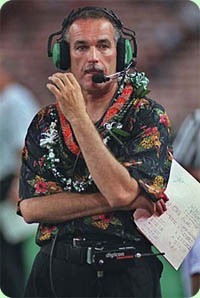It may have appeared Jones was headed for the easy road to retirement when he abandoned the high pressures of coaching in the NFL to take over at Hawaii.
Jones faced poor facilities, a paltry budget and inherited an 18-game losing streak.
The buildings and budget haven't changed much since he arrived in 1999. The results have never been better.
Jones has built a winning program, installed a sense of pride and has put the Aloha State in a football frenzy.
``I always knew that this program had a chance to be what it is right now,'' he said. ``It's special because it's not the school's team. I felt it was the state's team.''
Despite limited resources, rundown facilities and the challenges of being isolated in the middle of the Pacific Ocean, Jones is trying to establish the program as a consistent winner, a team that can compete with the best. Hawaii has won 22 of its last 23 games and 13 straight, the longest streak in major college football.
Jones has led the Warriors to the postseason in six of his nine seasons. He has also produced 16 NFL draft picks.
This season, the 10th-ranked Warriors (12-0) won their first outright Western Athletic Conference title, finished the regular season as the nation's only unbeaten team and earned a berth in the Bowl Championship Series to face No. 4 Georgia (10-2) in the Sugar Bowl on Tuesday night.
``I've always said, and I'm not just blowing smoke, there's nobody that could have done what June Jones has done,'' Hawaii defensive coordinator Greg McMackin said. ``I've been with some really good coaches and they're all great, but what he's done here is truly unbelievable.''
The first thing Jones did when he arrived in Honolulu was make the players believe in his run-and-shoot offense as well as themselves.
``You have to change the mind-set of the team,'' he said. ``That was No. 1.''
In his first season, Jones took over an 0-12 team and directed the biggest turnaround in college football history, going 9-4 in 1999 and taking Hawaii to its first bowl game since '92.
The following year, the team was given an identity with a new name, logo and colors. Hawaii ditched the rainbow logo with a bold, Polynesian-style ``H,'' and dropped the Rainbow nickname it had carried for 77 years, drawing criticism from longtime fans.
The idea was to call the players Warriors and maybe they'd play that way.
They certainly live in Spartan conditions. Hawaii's aging athletic facilities have been under scrutiny ever since star quarterback Colt Brennan complained there was no soap in the deteriorating locker room. The Warriors have to cope with broken film equipment and a condemned athletic field.
With only a $50,000 recruiting budget and ocean separating the nearest state, Jones also focused getting the top in-state players to stay home. Previously, they had gone to Pac-10 schools or as far away as Nebraska. In addition, Jones took in players that were jettisoned by other schools, such as Brennan, and mentored them.
Before Jones arrived, people on the island were simply indifferent to the football team, said defensive lineman Michael Lafaele, who grew up in Honolulu.
The University of Hawaii was better known then for its prowess in women's volleyball.
``He turned that whole state around. Now it's a football state,'' Lafaele said. ``Everybody wants to play football for Hawaii now. ... Before, it was us, wanting guys to come to our school.''
With his wide-open offense, his low-key demeanor and love for his players, Jones is an island icon.
He played quarterback for Hawaii in the early 1970s and got his coaching start in 1983 as its quarterbacks coach.
Before returning to Hawaii, Jones spent more than a decade in the NFL, serving as interim coach of the San Diego Chargers in 1998.
Jones turned down an offer for more than $1 million annually to stay with the Chargers and chose Hawaii, which offered him a little over $320,000 a year. He now earns $800,000, plus incentives, and is in his final season of his contract.
``If (money) was a factor, I would've stayed in San Diego,'' Jones said. ``I always felt the opportunity to do what you want to do in a place where you want to be was worth more. I've been talking about it for 25 years, coming back here and coaching.''
Jones insists it's the people of Hawaii that brought him back and they are what keeps him there.
``It's a great place, nothing quite like it,'' he said.
Jones was first contacted about the job in 1995, but he was the coach of the Atlanta Falcons and they were fighting to make the playoffs.
``I couldn't allow the disruption to happen at that time,'' he said. ``So I kind of thought I missed my opportunity.''
So, he jumped at the opportunity when Fred VonAppen was fired after three horrendous seasons with Hawaii, where he went 5-31.
Jones brought immediate success, then was nearly lost.
He crashed his car into a concrete pillar near the Honolulu International Airport on Feb. 22, 2001.
``There was no reason why I should have survived,'' he said. ``My aorta was torn and if it wasn't clamped in 15 minutes, death was 100 percent certain. They didn't find mine for four hours, so there is no reason why I am here today.''
He found a purpose bigger than playing in the BCS game, bigger than football.
``The good Lord saved me to help teach these young men not just about football but also life,'' he said.
(Copyright 2007 by The Associated Press. All Rights Reserved.)

June Jones
http://accesswdun.com/article/2007/12/205284
